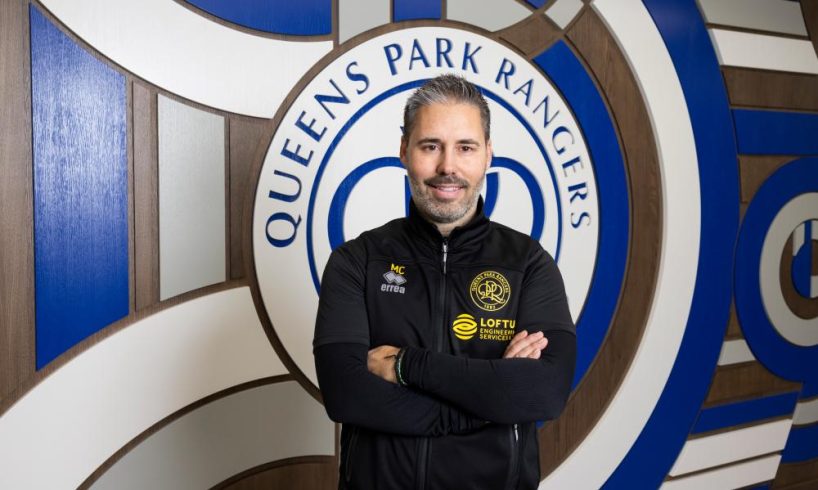
Photograph: Graeme Robertson/The Guardian
“In life and football there’s always some kind of risk, isn’t there?” Martí Cifuentes says. The Queens Park Rangers manager is thinking about his unusual journey and remembers the difficult early days at AAB Aalborg. “When I went to Denmark it took six official games for me to win,” the 41-year-old continues. “The headline in the main sport newspaper was ‘The worst coach ever in the history of the Superliga’.”
The barbs washed over Cifuentes. “I am very used to being inexperienced, too young, whatever,” the Catalan says. “I’m just a very optimistic person. I don’t have any magical recipe.”
What Cifuentes has is an adventurousness that has carried him through a managerial career that began when his mentor, Manolo Fernández, asked him to coach the under-19s of Sabadell, historically the third best side in Catalunya. “What is this?” Cifuentes thought. He was 21, playing at a low level, and assumed he would not go into coaching for another 15 years, but Fernández wanted to fast-track him.
“He saw I could understand the game when I was playing,” Cifuentes says. “He thought if I could express it that would make me a good coach.”
It was typical of Cifuentes to end his playing career and embrace the challenge. He was the youngest manager in Spain when he took over at Sant Andreu in the third division in 2014 and he experienced relegation with Sandefjord after joining the Norwegian side from AIK Stockholm’s academy in 2018.
Now Cifuentes is trying to keep QPR in the Championship. They were 23rd when they sacked Gareth Ainsworth in October. They were a direct side and had two wins from 14 games. If it did not seem they were crying out for their next hire to be a Johan Cruyff enthusiast who was working in Sweden, it also did not appear to be the wisest career move for Cifuentes.
Change has followed. Cifuentes, who once spent time studying at Ajax and Millwall, is in the process of revolutionising QPR’s style. “The guys have been excellent,” he says. “They have been open to new ideas. I thought these players could play the game I like.”
QPR, who host Southampton on Saturday, are in the last relegation place but have risen to within two points of Huddersfield and Millwall. Fans are talking about tiki-taka. Cifuentes, who raves about Xabi Alonso’s work at Bayer Leverkusen, remains modest.
“If I could have a camera now and watch what I was doing 20 years ago I’d probably feel embarrassed,” he says. “You develop a lot. But it’s true that to be a very good coach it requires different skills to a player. It’s a big help if you have been a good player and can communicate what you experience.
“But you can be an exceptional coach without being a fantastic player. What is important is to understand the players. What it is to play in front of 50,000, what is the feeling when you have a bad run. Empathy is important.”
But how can you understand what you never experienced? “It is important to listen and learn from players,” Cifuentes says. “The game belongs to them. My experience is the top people in football are very humble. I met Johan Cruyff when I was studying in Barcelona in his university. Every time he spoke to me he was extremely humble. There is a sentence in Spanish: the more you know about certain topics, the more you realise you don’t know so much about it.”
Cifuentes grew up in Sant Cugat del Vallès, a town north of Barcelona. His late grandfather played for Barcelona B and his late father supported the club. Cifuentes is still a Barça member. He remembers going to his first game at the Camp Nou – Atlético Madrid were the visitors – and seeing Cruyff’s Dream Team. He idolised Michael Laudrup. It informed his view of football.
“When I made the step to professional football in Spain, the youngest coach, big expectations, it was not easy,” Cifuentes says. “I am guided by my principles. There are certain things at some of the clubs I worked with that I didn’t agree with and I was sacked twice, but not for results. Sometimes in Spain it becomes a little complex to be head coach. I wanted to develop. I had opportunities but when it came in Sweden I thought it would be a fantastic step.”
A leap of faith took Cifuentes to AIK. He grew in Scandinavia and developed his attacking football. He is proud of winning promotion with Sandefjord and taking Hammarby into the Europa Conference League, although he is quick to divert praise to his players.
“It’s about understanding the capabilities of the players and trying to pass it on a bit,” Cifuentes says. “That is what coaches do. A guy that is trying to make a puzzle work. Sometimes this piece here doesn’t fit so you need to find a way that the piece works.
“It is a bit different as it is not just this piece connected to this one. What the right-back is doing affects the left-winger. The game is about 11.”
Cifuentes is always thinking about the puzzle. But is he dogmatic? A coach who will never compromise on his ideals?
“This is a good one,” Cifuentes says. “I have been reflecting a lot. By travelling around I realised what I was doing in Barcelona, if I was doing exactly the same in terms of training and playing, I would have crashed in Sweden. All coaches have a perfect way of playing in their head. But then the reality is: ‘I have two very good strikers – I only want to play with one but I have two.’
“The importance is expression. I will never change that I like to have possession. Not to be fancy but to be dominant. I suffer a lot when I see my team defending low inside our box.
“But I have seen amazing teams, Juventus or Inter, defending in their box for 90 minutes and they win titles. I feel I will lose the game. Other coaches feel it is the way to win. It is smart to recognise when you really believe in something. People say players are not smart. I disagree. Players are really smart. They are very good at detecting if someone is lying to them. At the same time you need to have some kind of adaptability.”
Cifuentes, who moved his family to London this week, remembers his chats with Cruyff. “It took hours for me to realise what he was saying. Cruyff had this way of speaking that was quite simple and then you understand being simple is a huge strength. I experienced that in Scandinavia.
“You need to run a lot? You need to run better. Football is about quality, not quantity. To come to cultures where the message for years is that we need to run more and then someone comes and says we need to run better, it is a bit of a shock.”
And so to QPR. Convention suggested that they needed a firefighter who knew the Championship and was prepared to play ugly football. They have gone in a different direction, though Cifuentes will not be drawn into saying that pragmatism is riskier than a bold approach.
“If both coaches say I promise I will win because I have a certain passport or a certain style … guys, every season someone goes down and someone wins the championship,” Cifuentes says. “If the successful way was to be as bold as Pep [Guardiola] and as Catalan as Pep everybody would sign bold Catalan coaches.
“I need to provide value if you want to call it unconventional thinking from QPR. I believe in competence, hard work, quality players. It’s not about having more experience in certain countries.”






